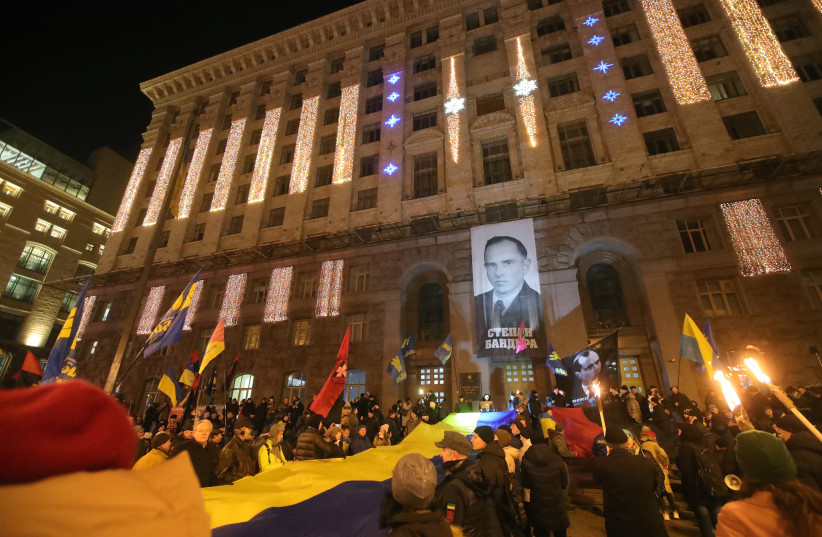An Israeli tweet against a Ukrainian neo-Nazi march over the weekend is being used in the war of words between Kyiv and Moscow ahead of a likely actual war.
Several thousand gathered in Kyiv on Saturday for the annual march in honor of the birthday of Stepan Bandera, the leader of the Ukrainian Insurgent Army, which collaborated with the Nazis in World War II, killing thousands of Jews and Poles.
“Israel condemns the Bandera nationalist march,” the Israeli Embassy in Ukraine tweeted. “The glorification of those who supported Nazi ideology tarnishes the memory of Holocaust victims in Ukraine.”
The Israeli Embassy demanded an investigation into “antisemitic manifestations” in the march, under the terms of a law passed by Ukraine’s parliament last year stating that “antisemitism and its manifestations are banned,” without stipulating punishments.
Ukraine is also a signatory of the International Holocaust Remembrance Alliance definition of antisemitism.

The march came as Russia has amassed troops near the Ukrainian border, which is widely seen as preparations for an invasion.
Each side of the 2014 Russia-Ukraine conflict accused the other of antisemitism, and Russia took up the tactic again on Saturday.
Russian state media TASS ran a story headlined “Israeli embassy in Kiev [Kyiv]condemns nationalists for honoring Nazi collaborator Bandera.”
Russian Ambassador to International Organizations in Vienna Mikhail Ulyanov tweeted: “The Embassy of Israel in Ukraine condemned this march. I wonder, if any Western Embassy did the same? Most likely not. It is not occasional that in the [United Nations General Assembly] they abstain on the resolution against glorification of Nazism.”
The Foreign Ministry in Jerusalem said that its statement has nothing to do with the tensions between Ukraine and Russia.
“This is a principled stance,” a Foreign Ministry source said. “Israel doesn’t ask who’s marching. If there is an antisemitic march or a march glorifying antisemites, it’s Israel’s job to react. Our values are very clear and we stand by them.”
The Foreign Ministry source also pointed out that the pro-Bandera march was not government supported, but one of the extreme Right in Ukraine, and said the embassy’s tweet “is only about the antisemitic march.”
Ukrainian President Volodymyr Zelensky is Jewish.
Andriy Tarasenko, leader of the Right Sector nationalist party, said, according to Radio Free Europe, that the march honoring Bandera comes “when there is a war with the occupier at the front and the struggle against the ‘fifth column’ in the rear.”
Ukrainian nationalists regard Bandera as a hero, with many arguing that he fought with the Nazis against the Soviet Union to gain Ukrainian independence.
Earlier this year, President Isaac Herzog wrote an op-ed ahead of a visit to Kyiv deploring “a dangerous trend of historical revisionism,” in which “some people feel tempted to glorify World War II war criminals or rehabilitate wartime collaborators.”
“It is dangerous because, nearly eight decades after the Holocaust, antisemitism is soaring again. It is dangerous because when the rot of anti-Jewish racism spreads, it ultimately destroys every country it infects,” Herzog wrote.
